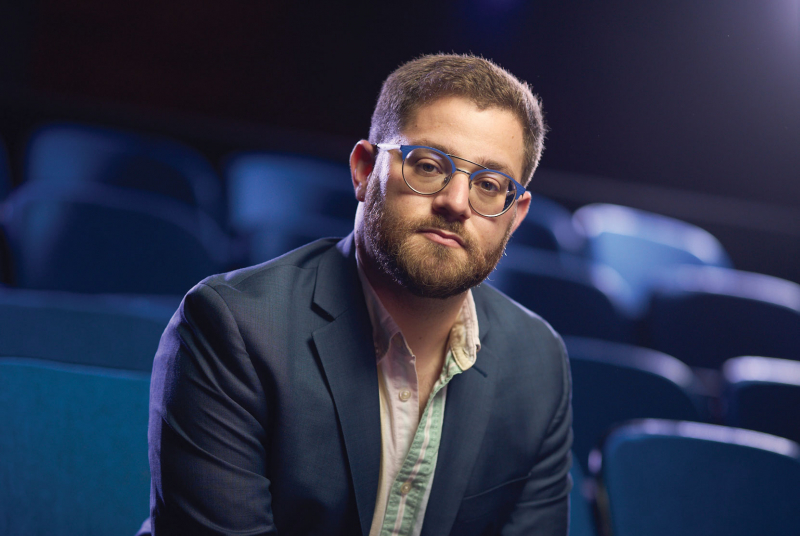
Behind The Scenes
Luke Katler is a natural when it comes to raising money for a theatrical production—even if little cash ends up in his own pocket.
In the seven years since he graduated, the 29-year-old has coproduced or produced several notable, multimillion-dollar shows on and off Broadway. His latest is POTUS: Or, Behind Every Great Dumbass Are Seven Women Trying to Keep Him Alive, which opened in April at the Shubert Theater on Broadway. The raunchy comedy chronicles the aftermath of a U.S. president’s public relations mess and how people in power have a tendency to make jerks of themselves.
Katler also coproduced Slave Play, which opened on Broadway in 2019 and got more Tony nods than any show in history. That play, which explores sexual relationships between masters and slaves, didn’t win any of the dozen awards it was up for, but the nominations led to a second Broadway run last year.
“It’s quite a frustrating reality that I have yet to make money as a producer, but I am gladly paying my dues for the time being,” says Katler, who majored in history and Italian. He’s working to position himself as a major player in the theater scene in hopes of changing it from the inside. “I’m championing projects that I love and that are calling cards for my tastes and ability to raise money.”
It’s Katler’s job as a coproducer to seek out potential investors and pitch the projects. Investors who put up the cash—with a minimum buy-in of $25,000—may have to wait years to recoup their investment and start making a profit, if they get it back at all. Katler is a bundler of those contributions, meaning that, like his investors, he might not ever make any money off the projects. “Obviously, it’s a high-risk, high-reward investment, and some people are down for that,” he says.
Potus features several well-known actresses, including Rachel Dratch ’88 and Vanessa Williams. “I get to play a character who is mousy and buttoned up, and then I get to go cuckoo,” says Dratch, a former Saturday Night Live cast member (who has nabbed a Tony nomination as best featured actress in a play for her role). “It’s very fun, and I’m happy to be a part of it.” Entertainment Weekly called the play, written by Selina Fillinger, “a foulmouthed political funhouse farce.”
Katler is also tackling a new off-Broadway project. He and business partner Max Hunter ’13 plan to launch a theater venue in Brooklyn’s hip Williamsburg neighborhood, and they are asking investors to support both the space and its maiden play—a revival of American Psycho The Musical. Katler will be the lead producer of American Psycho, and Hunter will direct. They are designing the venue to match the vibe of the show. “We want to build an immersive space that replicates the spaces where Wall Street douchebags of the 1980s would hang out,” says Katler, who thinks the 2016 Broadway production didn’t accurately capture the hipness of the story. “I was just in London, and I was inspired by how you would hang out in the venue and get a drink and talk about the show. We’re trying to replicate that idea of a community space.”
After American Psycho finishes its run, Katler and Hunter plan to rent out the venue to other production teams. That will create more revenue streams for the initial investors to earn a larger profit and help raise its status as a venue for immersive, experimental arts. “My dream and professional goal is to make theater cool again so it can be an actual public square of thought and entertainment,” Katler says.
His first professional lead producer gig was for a show called Off Broadway, which takes a scathing look at theater culture. It was slated to be a typical staged production with a 2021 launch date, but because of the pandemic, the production team had the actors perform from their homes and Zoomed the show to audiences. The new setup didn’t change how much work Katler had to do. He hustled to organize every aspect of the show—he vetted and hired lighting and costume designers, arranged filming locations, and helped raise money. For all that chaotic, exhausting work, he made $1,000.
And he loved it. “I think of the coproducer role as a means to an end in terms of my professional stature and ultimately becoming the principal decision-maker on a project,” says Katler, who supplements his income by tutoring and teaching Italian. “What is exciting to me is building a team and making a show happen.” He also hopes that American Psycho will be his first financial hit. “That is our big project, and I’m hoping it will be a big moneymaker,” he says.
Those around Katler say he’s got the energy, skill, and intuition to make huge waves in the theater industry. “He is the perfect person to push Broadway in a more progressive direction,” says Robert Koreman ’92, Katler’s high school art history teacher. “He was always interested in the arts and was always a performer. He has an intense intelligence about the craft and the messages behind it.”
Katler started directing and performing while he was at Dartmouth, both with the Rude Mechanicals Shakespeare troupe and in main-stage productions. For his senior thesis, he translated, adapted, produced, and directed the Italian play Accidental Death of an Anarchist. “It was a show about abusive police structures,” he says. “It was the right moment for it.”
Katler’s work as an undergrad was one reason Hunter chose to partner with him on the Brooklyn venue and American Psycho production. “The story really demands a serious conversation on the themes of toxic masculinity and consumer culture,” Hunter says. “The scale of this needed someone who understands the larger commercial industry, and Luke is an expert at that.”
Danielle Furfaro is a freelance writer and a former reporter at The New York Post.










